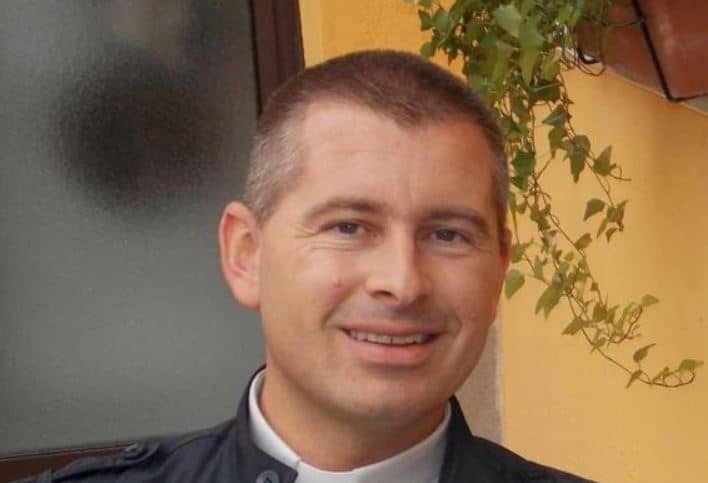ROME – Only two months ago Arturo Borelli, a clerical sex abuse victim from Italy, was beaming while walking down the avenue that leads to St. Peter’s Square. After 20 years knocking on the Vatican doors, they had finally opened.
On Feb. 15, during a meeting with members of the Roman curia, he was told that his case would be reopened, that he would be informed every step of the way, that things had changed in the wake of the February summit of bishops on the protection of minors.
More importantly for Borelli, a devout Catholic, he was told that Pope Francis knew about his case and cared about him.
RELATED: Abuse victim who chained himself to Vatican finds closure in meeting
Today, Borelli says he feels “defeated” in a phone conversation with Crux April 2. The Congregation for the Doctrine of the Faith (CDF), the Vatican department that handles matters of clerical sexual abuse, won’t answer his calls. His alleged abuser has been found innocent, but he was not informed of the sentence nor will he ever be able to know the details of the ecclesiastical trial.
“I cannot understand how they can speak of transparency!” Borelli said. “Is this Pope Francis’s transparency?”
Borelli’s case follows an unfortunate arc that Vatican observers have seen repeat itself over and over again, where initial efforts by the Catholic Church to bring forward welcoming, listening and closure for sexual abuse victims often results in sour disappointment and disenchantment.
Borelli, 40, claims to have been sexually abused about thirty years ago on the peripheries of Naples, Italy, by his religion teacher Father Silverio Mura. After the abuse was reported to the Archdiocese of Naples, Mura was moved from parish to parish, only to be found under a false name and teaching catechism to more than 40 children.
RELATED: Italian protesting clerical abuse arrested in front of the Vatican
After chaining himself to the Porta Sant’Anna — the main entrance to Vatican City — on Feb. 4 in a desperate attempt to be heard by Church authorities, the Vatican agreed to meet with him and his lawyer to reopen the case against Mura. The priest who greeted Borelli promised that “everything has changed” in the Vatican and that the matter would be resolved quickly.
“Once the sentence came out no one answered me anymore,” Borelli said, adding that the sentence “doesn’t seem credible to me because it’s a ghost sentence.”
Borelli and his lawyer were never informed by the CDF about the sentence and learned the result from Mura’s lawyer, who told the local press that his client had been found innocent. No press release or official document was published by the Vatican.
A lawsuit is being brought against Mura in the Italian courts, but Borelli had an emotional investment in seeing the matter resolved within the Catholic Church.
“For me, the ecclesiastical trial is very important, very important,” he said. “Because the Church must begin a major cleanup.”
The “contradictory” and “secretive” nature of the Church’s legal proceedings have been a tough blow for the Italian abuse victim, who said that his “pain is doubled, because the Church should welcome me as a mother.”
According to Borelli’s lawyer, Carlo Grezio, there are several reasons why Mura may have been found innocent, which could range from insufficient evidence to exceeding the statute of limitations since the events took place more than 30 years ago.
“Borelli was considered a witness and not a part of the trial,” Grezio told Crux in an April 2 phone interview, which means that “we are cut off from knowing the content of this sentence by the ecclesiastical tribunal.”
Grezio met Feb. 15 with two officials of the Congregation for the Doctrine of the Faith – a disciplinary section head Father John Kennedy, and undersecretary Father Matteo Visioli, who he claims promised him transparency and that they would be informed of the sentence.
“I am a bit disappointed,” he said, “I find that the Vatican can never make facts follow words.”
The lawyer looks to the civil proceedings now instead of the Vatican’s “castle of words” and promised “to never again have contact with the Vatican due to its behavior, which offends victims.”
Borelli, a big fan of Francis and his reform, still insists that the Vatican take action on these matters and looks to the Church for closure, but on the other side of the fence victims of clerical abuse have lost all faith in ecclesiastical proceedings.
“The canonical trial is not conclusive,” said Francesco Zanardi, a clerical sexual abuse survivor and president of the only Italian clerical abuse victims’ network Rete L’abuso, “unless the victim is satisfied by something like this.”
“If the pope really wanted to put this thing to rest overnight, we would impose on the bishops to report sexual abuse to civil judicial authorities,” he told Crux April 2.















